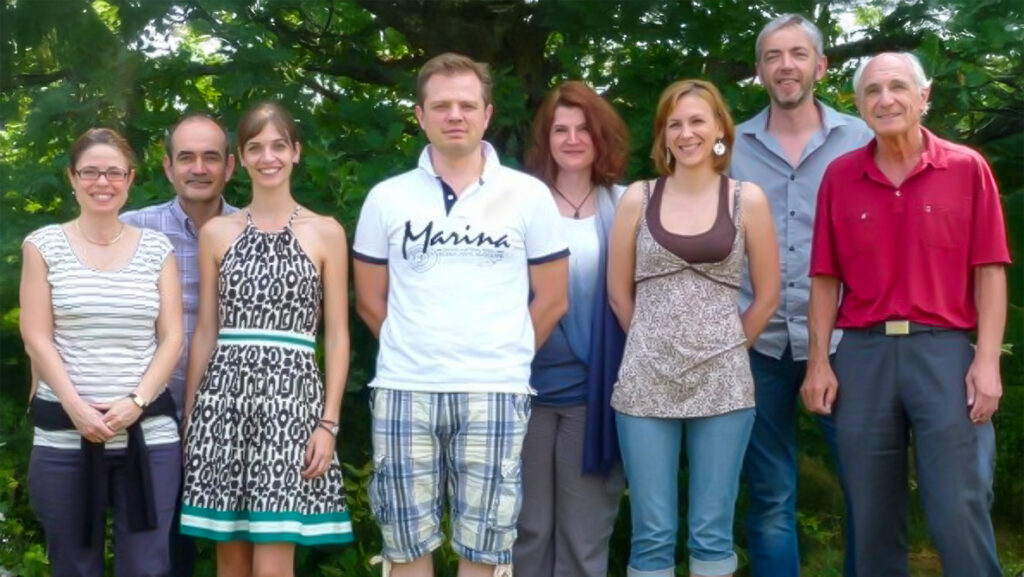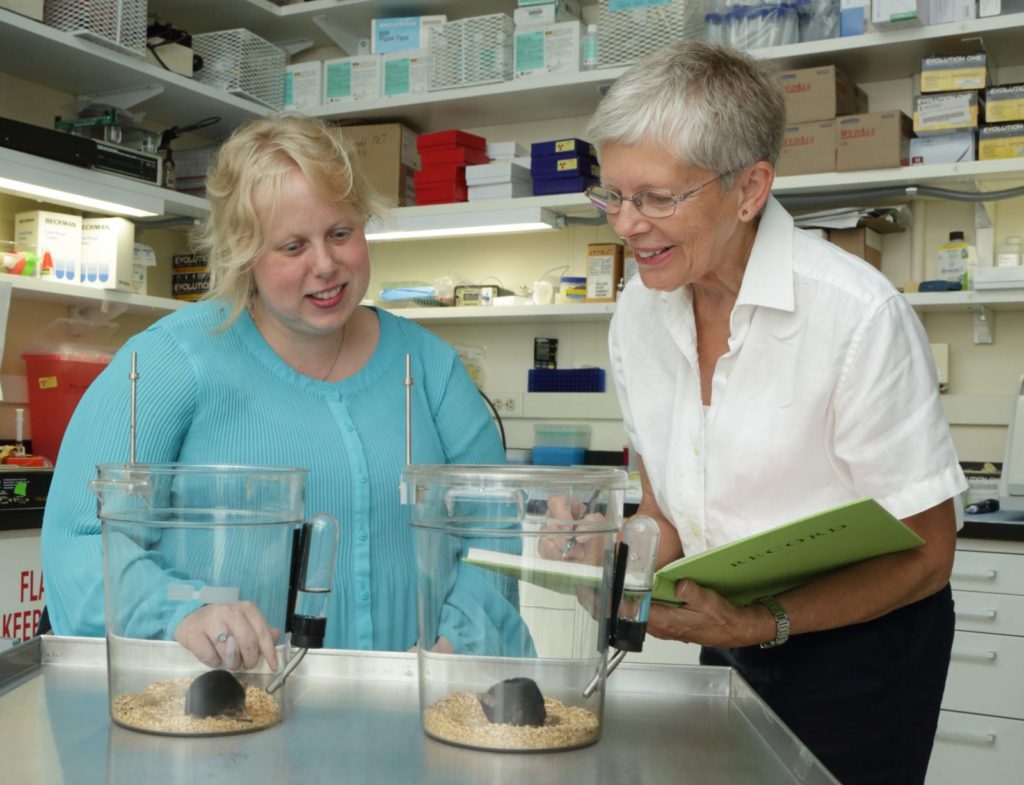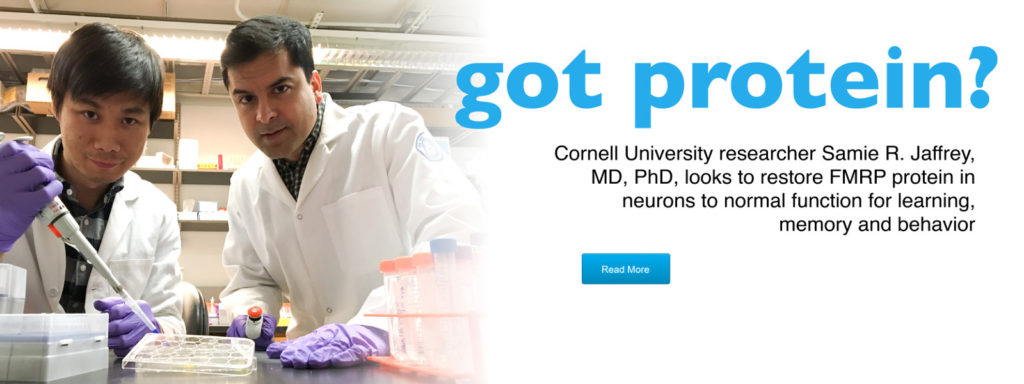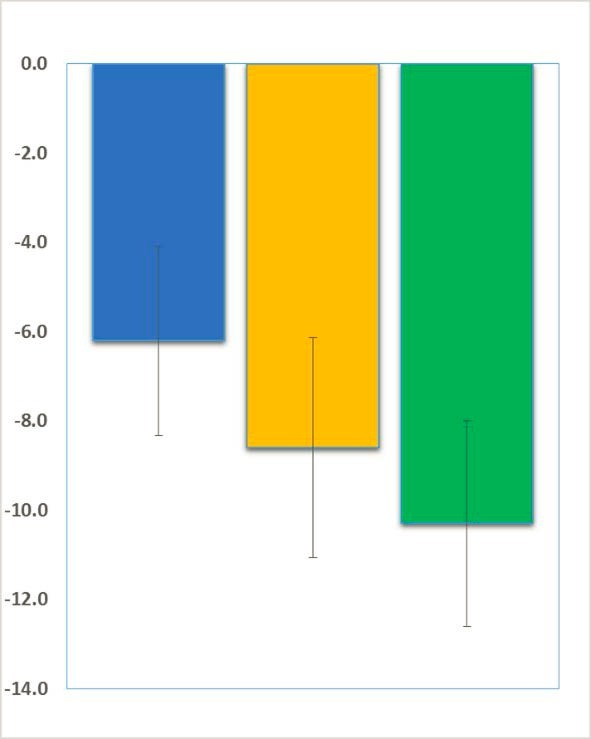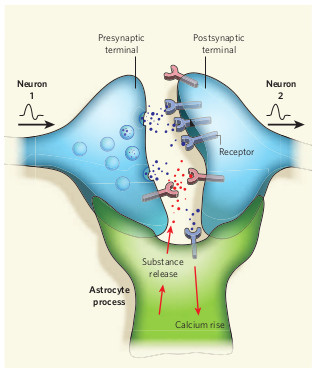New Fragile X Clinical Trial for Children Launching in June 2017
Rush University Medical Center Professor Elizabeth M. Berry-Kravis, MD, PhD, has launched and is recruiting participants for a large-scale clinical trial to study effects of AFQ056, an mGluR5 blocker, on learning in young children.
Correcting Defects in Astrocyte Signaling in Fragile X Syndrome
Astrocytes, brain cells which support neurons, do not transmit signals. Fragile X treatment strategies have been proposed based on correction of “astrocyte phenotypes”.
Sensory Hypersensibility in Fragile X Syndrome and BK Channel Openers
With $366,100 in FRAXA funding, researchers tested BK channel–opening drugs to fix sensory abnormalities in Fragile X mice; early results showed broad behavioral rescue.
Repurposing Drugs to Dampen Hyperactive Nonsense-Mediated Decay in Fragile X Syndrome
FRAXA-funded research showed nonsense-mediated mRNA decay is overactive in Fragile X, pointing to existing NMD-suppressing drugs like caffeine as potential treatments.
Kimberly Huber, PhD, Explores Hyperexcitability in Fragile X Syndrome
What causes hyperexcitability? Dr. Kimberly Huber seeks to understand how FMRP regulates connections between brain cells and the function of brain circuits.
Altered Sleep in Fragile X Syndrome: Basis for a Potential Therapeutic Target
With this FRAXA grant, Dr. Carolyn B. Smith and Dr. Rache Sare at the National Institute of Mental Health investigated the basis of sleep problems in Fragile X syndrome.
Cornell University Researcher Looks to Restore Fragile X Protein in Neurons
Which is the right FMRP for therapeutic development of Fragile X syndrome? When researchers develop effective drugs that reactivate FMRP — the protein that is normally silenced in Fragile X — what in the world will they do next? So ponders Cornell University researcher Samie R. Jaffrey, MD, PhD. Jaffrey, professor, Pharmacology, Weill Cornell Medical College, Cornell University, knows reactivating FMRP will lead to many important questions, such as: Which cell type needs FMRP? How much FMRP protein is needed to restore brain function? Where in the brain will FMRP protein be needed? Where in a neuron will the FMRP needs to be expressed?
Researcher David Nelson, PhD, Explores New Cell Strategies for Fragile X Syndrome, FXTAS and FXPOI
It’s rare to find a researcher working on the Big Three — Fragile X Syndrome (FXS), Fragile X-associated Tremor/Ataxia Syndrome (FXTAS) and Fragile X-associated primary ovarian insufficiency (FXPOI). Then again, David Nelson, PhD, is the rare bird. Nelson is a professor of Molecular and Human Genetics, Baylor College of Medicine, and director of Baylor’s Graduate Program in Integrative Molecular and Biomedical Sciences. He has been involved in FXS research since the late 1980s where he helped identify the mutation and the FMR1 gene. These days, researchers in Nelson’s lab at Baylor are studying FXS, FXTAS and FXPOI using mouse models.
The X Factor – Turning on X Chromosome Genes to Treat X-linked Disorders
Harvard researcher Jeannie T. Lee, MD, PhD, moves closer to turning on select genes on the X chromosome to treat people with X-linked disorders.
Fragile X Fruit Fly Research Bears Fruit
A new FRAXA-funded study shows how the hormone insulin – usually associated with diabetes — is involved in the daily activity patterns and learning deficits in the fruit fly model of Fragile X Syndrome (FXS). The study also reveal a metabolic pathway that can be targeted by new and already approved drugs to treat Fragile X patients, notably metformin.
Fragile X Cure One Step Closer with FRAXA Support of $1 Million in New Research
4 Countries – 10 Teams – $1 Million for finding new treatment targets, to pinpointing outcome measures for future clinical trials, to attempting to reactivate the gene which is silenced in Fragile X syndrome, these innovative scientists will bring us closer to a cure.
Abnormalities of Synaptic Plasticity in the Fragile X Amygdala
With FRAXA funding, Dr. Sumantra Chattarji at NCBS explored how Fragile X alters amygdala function. Results were published.
Neuren’s Tofinetide Successful in Phase 2 Clinical Trial in Fragile X
We are pleased to share great news adapted from Neuren’s press release: Neuren’s phase 2 trial has successfully established proof of concept and provides a strong rationale for Neuren to move forward with developing trofinetide for Fragile X syndrome. In this initial small trial with a relatively short treatment period, trofinetide was very well tolerated, with the high dose (70 mg/kg twice daily) demonstrating a consistent pattern of clinical improvement, observed in both clinician and caregiver assessments.
FRAXADev – Developing BK Channel Openers for Fragile X Syndrome
A number of people have asked us about FRAXADev, a new project starting in France; this is a nonprofit initiative which seeks to develop a new kind of drug for Fragile X. The drugs they are interested in testing in Fragile X clinical trials were developed by Bristol-Myers Squibb many years ago, and are now off patent. This class of drugs opens a potassium channel in the membrane of neurons, which helps to decrease neuronal excitability.
Fruit Flies to Model and Test Fragile X Treatments
Boosting cAMP signaling restores memory and fixes brain-signaling defects in Fragile X models, suggesting diabetes drugs like metformin may help.
Fragile X Treatment: New Research Directions
In the wake of negative results from several high-profile clinical trials in Fragile X, we find ourselves questioning many of our previous assumptions about the nature of this disorder. After all, understanding the basic pathology of disease is critical to development of new treatments — this is true across the board, in all branches of medicine.
Fragile X Programs at UMASS – University of MA, Worcester
Fragile X Syndrome Behavioral Health Clinic The Center for Autism and Neurodevelopmental Disorders (CANDO) is opening a specialty clinic for individuals with Fragile X Syndrome (under the direction of Dr. Jean Frazier) to evaluate and provide treatment for behavioral challenges.
The Endocannabinoid System in a Mouse Model of Fragile X Syndrome
Fragile X disrupts endocannabinoid signaling. This study in mice demonstrated that correcting it may calm brain hyperexcitability and improve symptoms.
Inhibitors of STEP as a Novel Treatment of Fragile X Syndrome
STEP inhibition reversed behavioral and synaptic Fragile X deficits in mice (Neuropharmacology, 2018), highlighting STEP as a promising treatment target.
NIH Awards $35 Million to Three Fragile X Research Teams
NIH is investing $35M in three Fragile X Research Centers. All teams have been funded by FRAXA and will now receive over $2M annually for five years.
Functional Interplay Between FMRP and CDK5 Signaling
FRAXA-funded work showed CDK5 signaling is disrupted in Fragile X. CDK5 drugs are in development for Alzheimer’s so this pathway offers a promising new FX treatment angle.
Computational Analysis of Neural Circuit Disruption in Fragile X Model Mice
FRAXA-funded researchers used advanced computer models to uncover how FXS brain circuits change and predict which treatments may correct them. Results published.
Why Did Fragile X Clinical Trials of mGluR Antagonists Fail?
by Michael Tranfaglia, MD. In my opinion, the Fragile X clinical trials of AFQ056 sponsored by Novartis failed because of a dose range that was inadequate for Fragile X, and because of the unexpected development of tolerance.
What Treatments Work for FXTAS?
FXTAS affects many in our Fragile X community. Research aims to uncover its cause and guide more effective treatments.



